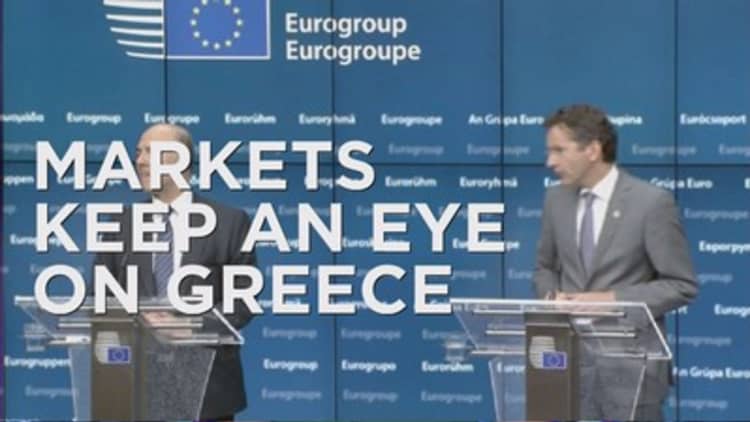


The Greek government's new proposals to resolve its debt dilemma represent a "welcome step", according to the President of the Eurogroup, Jeroen Dijsselbloem - but are not enough to secure an agreement today .
Dijsselbloem, who was speaking after a meeting of the euro zone's finance ministers to discuss the new proposals, held out the possibility of a reforms for rescue deal later this week.
Calling the proposals "a positive step," the head of the group of euro zone finance ministers said, however, that the Greek delegation was unable to give a "full and in-depth assessment". "Work can start immediately as far as we are concerned," he added
"If necessary, the eurogroup will have meeting later this week to hear final outcome."
Despite the signs of deadline fatigue in the markets, Monday is crucial precisely because there have been so many missed opportunities before. And this may be the last opportunity to halt Greece's course towards defaulting on its debt repayments and eventually leaving the euro.
On Monday, finance ministers arriving at the summit were skeptical about the chance of success, and suggested that the new Greek proposals did not represent enough of a change from those rejected before.
"Without substantial proposals we cannot seriously prepare a summit on Greece," Wolfgang Schaeuble, the German finance minister and a long-time critic of the Greek administration, said on arrival.
"We have wasted a lot of air miles today," Alexander Stubb, his Finnish counterpart, added.
There was added confusion over whether the Greek government had in fact sent the right set of proposals to the finance ministers overnight.
If a deal is not reached by the end of June, Greece is unlikely to be able to make its next payment to the International Monetary Fund (IMF), and will be in default territory.
The hemorrhage of cash from the Greek banking system, one of the most important elements of its solvency, is expected to continue until there is some sign of stability.
What’s the schedule on Monday?
The European Central Bank will met at Monday to discuss Greek liquidity.Reuters, quoting an unnamed source, reported that the bank had raised the ceiling on its emergency liquidity assistance for Greece's banks.
Afterwards, euro zone finance ministers will meet to discuss the Greek at 10.30am GMT. This will be followed by a meeting of all the euro zone leaders, to either agree or disagree on the path forward for Greece. The movement of Greece's financial trauma from technical to political problem is illustrated by this meeting.
German Chancellor Angela Merkel, a politician who is characterised by caution, will have to make potentially the boldest move of her long political career.
"After a decade in office, Merkel is for the first time ever forced into a large-scale, yes-or-no decision that will force her to invest significant political capital," analyst at Teneo Intelligence pointed out in a research note.
Greek Prime Minister Alexis Tsipras, and his finance minister Yanis Varoufakis, are expected to be given two options: accept the reforms proposed by his country's creditors, possibly with some small concessions to make them more palatable domestically, or brace for a default.
Concerns are rising that their proposals might not seem to have moved much from their previous position – which proved unacceptable to other euro zone members. Deputy Labour Minister Dimitris Stratoulis, who is on the far left of Tsipras's Syriza party, told Greece's Antenna television that the party didn't want cuts to wages or pensions, a key part of the previous discussions.
Greece is now offering to gradually raise retirement age to 67, and have a 23 percent main sales tax, with lower sales tax for energy, basic goods, medicine and books, according to reports.
The retirement age concession is a step forward, as Greek men retire at 63 on average, and Greek women at 59. While an earlier Greek administration had agreed to raise the retirement age to 67, this has not yet been carried out.
What happened over the weekend?
Merkel; her French counterpart, Francois Hollande; and European Commission President Jean-Claude Juncker told Tsipras in phone conversations over the weekend that the struggling Mediterranean country must secure a deal with its creditors before they will release much needed funds.
Meanwhile, Varoufakis stepped up the public relations offensive, with long articles in both the Irish Times and Frankfurter Allgemeine Sonntagszeitung appealing to the cognoscenti of Ireland and Germany. The Greek cabinet met to discuss the events of this week.
And what happens next?
Even if there is a deal, there is no guarantee that both sides won't have to be back at the negotiating table a few months down the line.
"We see little scope for a happy middle ground here, given the unified position being presented by creditor countries," economists at RBC warned in a research note.
- By CNBC's Catherine Boyle




